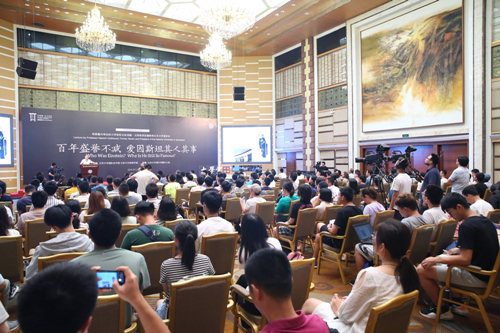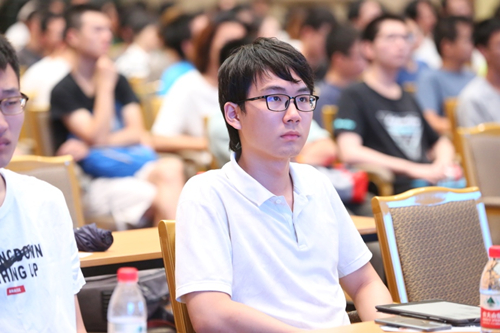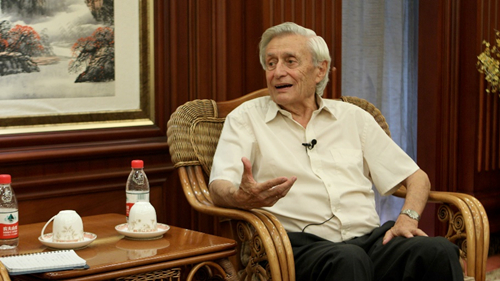Peking University, Sep. 20, 2019: 2019 marks the 140th anniversary of the birth of Albert Einstein. As the academic head of the Albert Einstein Archives and former chancellor of the Hebrew University, Professor Hanoch Gutfreund might be one of the most knowledgeable in the world about Einstein. And he is also connected with China through Einstein. Professor Tian Gang, vice president of Peking University, after visiting Hebrew University and learning about the Archives, invited Professor Gutfreund to come to Peking University. There he shared the life story of Albert Einstein, and his insights about innovation, learning and education. His lecture has been collected in “The Great Learning Series at Peking University”.
Einstein and Hebrew University
Einstein was born in Germany. All his great discoveries were made when he was still in Europe. He visited Palestine 25 years before the State of Israel was established. He was a founder of the Hebrew University. He is considered a visionary, together with other great intellectuals and scholars of modernity such as Sigmund Freud, who was also one of the founders. There were other great mathematicians from great centers of learning in Europe who contributed to the establishment of the Hebrew University, to science in Israel, and to intellectual life in Israel. First because they had Jewish identity, and there was anti-Semitism in Europe: the rules against Jewish students, then the rise of Hitler, when many great scholars suddenly became homeless in their own homeland, Germany, and many of them moved to Palestine, and then to Israel. All these contributed to the development of science.

Science vs. Humanities
In Professor Gutfreund’s view, first of all, the culture of appreciation of science counts, and so do people who promote science. Nonetheless, he believes science cannot be separated from the humanities, as the problems that mankind is facing will not be solved by science and technology alone. Although they will not be solved without science and technology, the application of science also requires understanding of how society works, of what motivates people, of what people dream about. So there is no single recipe for the making of scientists.

Culture of Innovation
Innovation today implies not only the discovery of new phenomena and principles, but also innovative way of applying them in the fabric of society. In that sense, innovation is a culture that has many presentations and many implications. Professor Gutfreund pinpointed that the key lies in how you create an education system — an atmosphere at university to prepare students for a culture of innovation, and to live in a culture of innovation. It is a challenge, yet it should be a goal that scholars and leaders of universities keep in mind. To this end, various kinds of incentives could be developed in education; for example, Olympiads. In Europe, there are young scientists’ competitions where young students are encouraged to do some mini research work.
Knowledge is Central
It is hard to balance between acquisition of knowledge and mastery of skills. Even Einstein once said that curiosity is more important than knowledge. Professor Gutfreund argues that curiosity is important, imagination is important, but knowledge is still central. How to acquire knowledge is a different question. Einstein also said the most important thing that people should know is where the library is, because all the knowledge is there. But Prof. Gutfreund stressed that not everybody is Einstein. Therefore it’s very important that the society develops many auxiliary access points to learning in addition to formal education, for example, science museums. They are essentially science education centers that expose general people of all ages to principles of science and developments of science in an innovative and pleasant way.

Harmony in Education
In Israel, there is a metaphor of a carpet for education. When a carpet is weaved, all the threads and all the colors are put together to create harmony. It is like education. Usually, in science, in the education system, teachers and others emphasize the results. Professor Gutfreund advocates putting a greater emphasis on the process than people did in the past. How were these results achieved? What questions were asked? What were the difficulties? All these are no less important than the results themselves. It took Einstein eight years to develop the Special Theory of Relativity and the General Theory of Relativity, and he made many mistakes on the way. So making mistakes and learning from them is the part of the process.
What Is Key to Innovation?
In the American tradition, universities, including the great ones, depend fully on philanthropy, and the chancellor is responsible for generating funds for the university; whereas in the European universities, the rector is an academic head and it is not the responsibility of the university but that of the government to generate funds. The higher education system in Israel is mixed in this regard.
In the Jewish culture, there is a strong tradition of learning, as expressed in the saying: ‘Learning for its own sake, without any goal.’ Learning is highly appreciated in the culture. So maybe it is carried over to the younger generation in certain ways, and this is one of the attributes of the younger generation. They are entrepreneurial, they are curious and they learn. The key to innovation is learning for its own sake, intellectual curiosity, rather than for an immediate commercial product or return.
Could Technology Replace Teaching?
Professor Gutfreund observes that whenever there is a new technology, there will be arguments about its potential impact upon education. For instance, when the radio appeared for the first time, immediately there was great hope it would revolutionize the entire education system. It is true that technology produces new elements and enriches different possibilities, such as computer-aided courses and computer-aided education. However, Professor Gutfreund believes that it cannot replace the need for the human contact of professor, student, assistant, of doing exercise classes, and it cannot replace completely the original front teaching and interaction with the students. On the other hand, computer technology makes it easy to access resources and databases. Big data is the catchword.

How Does China Take a Leading Role in Science?
This is the second time that Professor Gutfreund has visited China. It seems to him that China is very successful in science. For instance, more than a hundred years ago Einstein predicted gravitational waves, and that when two massive objects somewhere in the universe collide there would be an effect that would reach the earth. There was a great excitement in the world of physics three years ago they were detected. Now the Chinese scientific community is launching the most ambitious project of detecting gravitational waves not through detectors on the ground, but through detectors on satellites out in space. This has many advantages. Technologically and scientifically, it is a very challenging project. Something like this requires a very strong basic scientific system and a very strong resource of human talents in all aspects of theory and experiment, as well as the technology and engineering. Apparently, the Chinese education system was able and is able to produce that talent. “It seems to me,” says Professor Gutfreund, “that it is very likely the Chinese will take a leading role in exploring that phenomenon.”
About The Great Learning Series at Peking University:
The Great Learning Series at Peking University is a brand-new global-facing speech platform created by Peking University with the purpose of gathering distinguished guests from all around the world, bringing together ideas and wisdom, sharing knowledge and values, and presenting remarkable speeches to the world through bilingual videos.
This speech series consists of six unique editions: Important Political Figures Edition, Nobel Laureates Edition, Leading Scholars Edition, University Presidents Edition, Chinese and Foreign Ambassadors Edition, and Industry Leaders Edition.

Reported by: Wang Yan
Edited by: Zhang Jiang






